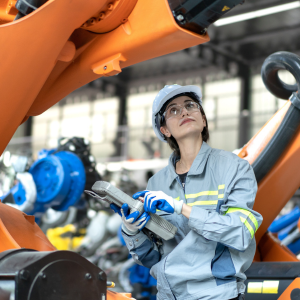Consumer Tech In
Industrial Factories
Post By: Ryan King On: 24-08-2018 - Industry Trends - Manufacturing
The year is 2018; factories are adopting more and more technology to improve their productivity, performance and safety. As these companies start integrating their systems with each other and the cloud as part of the on-going Industry 4.0 movement we are seeing them introduce and integrate consumer tech with their industrial processes. In 2017, Google launched a new Google Glass product aimed for enterprise usage while they discontinued the production of their original Google Glass. Glass started in 2017 and was not adopted as well as Google expected due to consumers being worried about their privacy. However, Google re-launched the product with a focus on enterprise and industrial settings like factories.
Companies have been slow to introduce the disruptive technology due to no clear direction on how the device can integrate with current processes and how they can improve their existing workflows. With the small group of companies adopting the product, there has been a significant development in new apps that allow a variety of tasks to be simplified;
- Manufacturing, some users have developed a solution to place instructions in the user's line of sight when manufacturing products like cars.
- Quality Control, with apps designed for monitoring and recording data, quality control teams can have a hands free process for checking the quality of products leaving their factory.
There are more and more apps and processes being developed by teams from all over the world to improve the experience and business processes. Time will tell if Google Glass can become a vital tool for factories.

As technology has been developing over the last few decades, we have seen increased interest in the developments. One current trend that is starting to be adopted by industries is Virtual Reality (VR). VR devices consist of a wearable display which immerses the user in a virtual environment.
While VR has been associated with gaming recently, VR headsets are being used to simulate environments and tasks that would either wise be expensive to test for manufacturers.
With the development of these simulation tools, more businesses are looking to adopt the technology. In 2016 a PWC survey found that more than 33% of US manufacturers are already using VR Technology or are exploring the possibilities of introducing it to their business within the following three years.
The automotive industry has been the leader in the adoption of new technologies like VR. The American automotive manufacturer Ford, have been using the Oculus Rift headset to help with the designing of their cars. Ford has also been using VR to test designs, features and individual elements of the vehicles without having to build expensive prototypes. VR allows the company to reduce the time spent developing the product cutting the time to production. Ford has also used VR to train employees on aspects of health and safety in a secure and safe environment.
Another trend which has been developing in the technology and software industry of the last ten years has been BYOD (bring your own device) policies. Factories have started to adopt this trend by encouraging and even incentivising their employees to use their own mobile devices to access corporate data.
In 2018 it is estimated that there are 4.9 million smartphones worldwide and this is expected to increase significantly over the next few years with rapid developments in new features and security.
While a BYOD policy reduces costs for businesses, it also has its downsides. Some companies have concerns over security as the device has access to corporate data which in some cases contains sensitive data. However, there have been many developments in recent years that have helped secure corporate data and improve cyber business security.
Industrial factories have been incorporating consumer tech into their factories for a few years. We are now seeing more factories adopting new technology, thus improving their manufacturing processes, quality control and safety. This trend is expected to continue to grow.
Get More From Rowse Straight To Your Inbox




